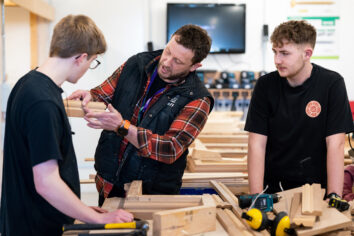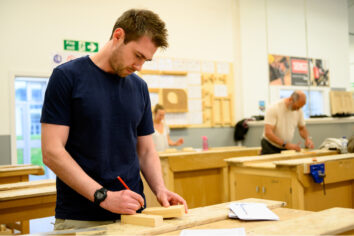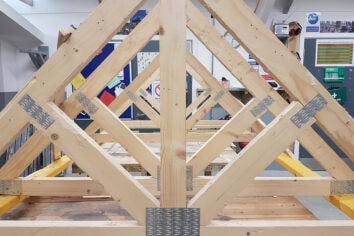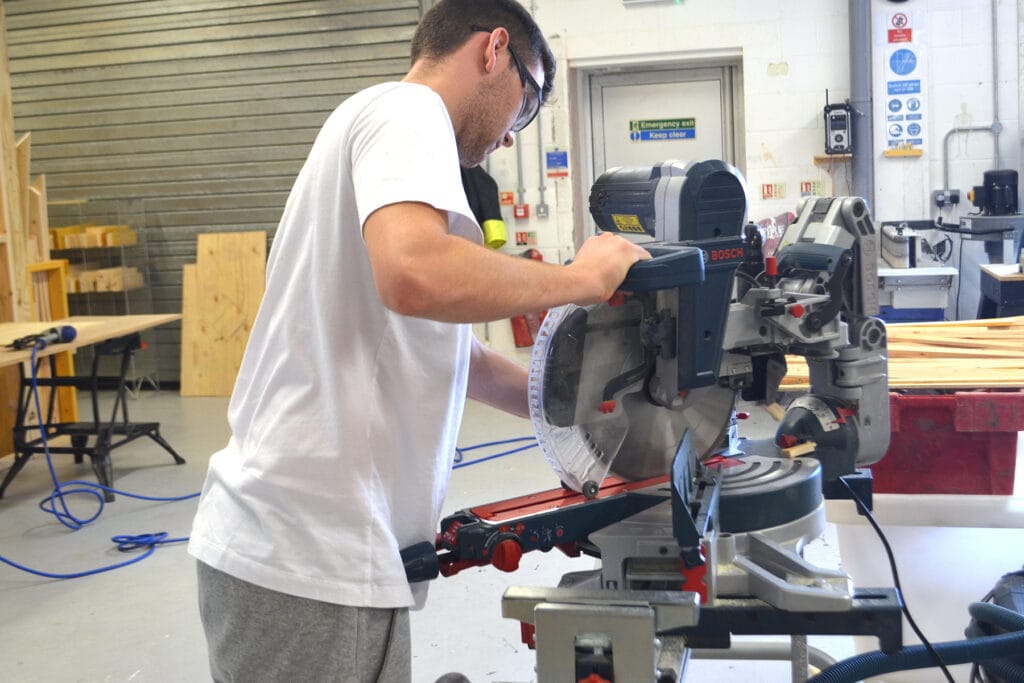New students starting in September: You can find more information about Induction days and submitting your GCSE results in our Start of Year Guide.
Why Choose This Course?
This apprenticeship standard offers a comprehensive training programme for individuals passionate about working with wood-based materials to create and install building components. This apprenticeship focuses on developing skills in setting out, marking out, and manufacturing architectural products such as doors, windows, staircases, and associated ironmongery. Apprentices will gain hands-on experience in a workshop environment, working closely with architects, designers, and other construction professionals to bring designs to life. The programme emphasises safety, precision, and quality, preparing apprentices for a rewarding career in the construction industry.
Apply for this course
Start date: 20/10/2025
Top Course Highlights
Industry-standard facilities
Highly experienced tutors
Develop skills in line with industry needs

Learn from sector experts
Gain invaluable insights and hands-on experience from industry expert tutors who bring real-world knowledge and expertise to the classroom. Their guidance will help you develop the skills and confidence needed to excel in your chosen field.

Enjoy professional environments
Enhance your practical abilities and gain hands-on experience that directly translates to the workplace. This apprenticeship course focuses on real-world applications, ensuring you are well-prepared to meet the demands of your chosen career.

Develop skills in line with industry needs
Immerse yourself in a dynamic and supportive environment that mirrors the professional world. This apprenticeship course provides access to state-of-the-art facilities and resources, helping you to thrive and feel confident in your career journey.
What Will I Learn?
Knowledge This apprenticeship equips learners with essential knowledge in several key areas. Apprentices will understand the principles of health, safety, and welfare, ensuring a safe working environment. They will learn to interpret technical drawings and specifications, enabling precise setting out and marking out of materials. The course covers the properties and uses of wood-based materials, as well as the techniques for manufacturing and assembling architectural products like doors, windows, and staircases. Additionally, apprentices will gain insights into effective communication and collaboration with architects, designers, and other construction professionals to meet client expectations.
Skills This apprenticeship develops a range of practical skills essential for the trade. Apprentices will master the techniques of setting out and marking out wood-based materials, ensuring precision in their work. They will learn to operate various woodworking machinery and tools safely and effectively. The apprenticeship covers the manufacturing and assembly of architectural products such as doors, windows, and staircases, focusing on quality and accuracy. Additionally, apprentices will hone their ability to install these components, working collaboratively with other construction professionals to meet project specifications and client expectation.
Behaviours Apprentices will prioritise health and safety, demonstrate reliability and punctuality, and maintain a positive attitude. Effective communication and teamwork are essential, along with attention to detail and a commitment to high-quality work.
Typical Duties that an Apprentice will carry out in the workplace:
- Setting out and marking out wood-based materials according to technical drawings and specifications.
- Manufacturing architectural products such as doors, windows, staircases, and associated ironmongery.
- Operating woodworking machinery and tools safely and effectively.
- Collaborating with architects, designers, and other construction professionals to ensure the final product meets client expectations.
Where Will It Take Me?
Completing the Architectural Joiner Apprenticeship opens up a range of exciting career opportunities. Apprentices can progress to roles such as skilled joiners, site carpenters, or bench joiners, working on bespoke projects or large-scale construction. Apprentices can also progress to the Level 3 Craft Architectural Joiner Apprenticeship Standard with Truro & Penwith College.
Assessment Arrangements
The End-Point Assessment (EPA) is a crucial component of apprenticeship standards, designed to evaluate an apprentice’s knowledge, skills, and behaviours (KSBs) acquired during their training. The EPA typically includes a combination of practical assessments, professional discussions, and portfolio reviews, ensuring apprentices are fully prepared for their chosen career. This assessment is carried out independently by an End-Point Assessment Organisation (EPAO), ensuring impartiality and fairness. Employers play a key role in confirming readiness for the EPA, supporting apprentices throughout the process to achieve successful outcomes.
EPA (End Point Assessment) methods
- Multiple Choice Knowledge Test
- Practical Skills Assessment with Questions
- Professional Discussion (Interview) underpinned by a Portfolio of Evidence
Entry Requirements
Grade 2 GCSE (E) in English and Maths.
Additional Information
We provide all of the tools and materials for the course, however you will be responsible for your own PPE and will be required to come equipped with a pair of steel toe capped boots and a pair of safety glasses.
Meet the staff, tour the campus and find out about life as a student at one of the best colleges in the country.







